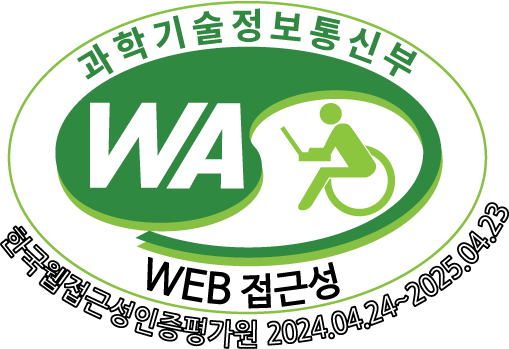International Organization Cooperation
As a regional commission of United Nations Economic and Social Council, ESCAP focuses on the development of the Asia and Pacific region, consisted of 53 member states and 9 associate member states. UN ESCAP declared ‘The First Asian and Pacific Decade of Disabled persons (1993-2002)’, which is the first regional level declaration to succeed the ‘United Nations Decade of Disabled persons (1983-1992)’. Following the first, second and thrid decade, currently implementing ‘The Fourth Asian and Pacific Decade of Persons with Disabilities (2023-2032)’. As the secretariat of the Asian Pacific Decade of Persons with Disabilities, UN ESCAP supports the member states to ratification and implementation of the United Nations Convention on Rights of Persons with Disabilities.
The member states of UN ESCAP determined the path of action of ‘The Third Asian and Pacific Decade of Persons with Disabilities (2013-2022)’ as Incheon Strategy to Make the Right Real for Persons with Disabilities in Asia and the Pacific, consecutively inherited during the fourth decade. KODDI cooperates with UN ESCAP and supports assistive devices for Accessibility centre in UN ESCAP headquarters, supports the UN ESCAP statistics project, and facilitates the MRR Fund Working Group Meeting. The Secretariat plans to conduct various cooperative projects with UN ESCAP.
UN ESCAP-KODDI Project
Background
The absence of reliable and comparable data on disabilities has been pointed out as the main obstacle to successful fulfillment of MRR Fund, and accurate evaluation of the status quo. When preceded with reliable data building, the data would be scientific evidence as to policy making for the persons with disabilities. To meet this end, UN ESCAP and the secretariat check the national statistics system, and collect the relevant data in the Asian-Pacific region. The official name of the project is ‘Towards the Incheon Strategy to Ensure the Rights of Persons With Disabilities in Asia and the Pacific', and the project duration for the 1st phase was from February 2014 to December 2018. The second phase of the project, which began in October 2019, is scheduled to run until December 2024 and aims to provide support and consulting to governments and the private sector in the Asia-Pacific region to achieve Incheon Strategy indicators.
Activities
UN ESCAP statistics project aims to guide data collection and generation of each ESCAP member state and stake holders: the government offices in charge of national disability policy, national statistical office, and civil society organizations(CSO). Through providing consultation with relevant methodologies and tools, UN ESCAP encourages ESCAP states to build national action plans for data collection on the Incheon Strategy indicators.
Moreover, the ESCAP statistics project promotes the fulfillment of Incheon strategy by knowledge enforcement, information development and disability research in the context of 2030 Agenda for Sustainable Development Goals.
As the result of the 1st phase project, UNESCAP has completed national consultation meeting for 17 countries including Bangladesh (2014), Mongolia, Philippines, Thailand, Vietnam, Marshall Island (2015), Bhutan, Indonesia, Georgia (2016), India, Kyrgyzstan (2017), Pakistan, Micronesia, Azerbaijan, Myanmar, Sri Lanka (2018).
For the 2nd phase project, along with the technical advisory services country-level programme pilot projects in priority thematic areas of the Incheon Strategy would be implemented. Through these, countries in AP region will take one step forward toward achieving the goals of Incheon Strategy.
Providing Accessibility Centre and Assistive Devices
Background
UN ESCAP located in Bangkok, Thai, convenes the facility for international conferences and networking hub between regions to encourage disability inclusive international cooperation. Although the agreement to “leave no one behind” has shown much increase, the UN ESCAP headquarters lacked to equip the facility to assist the persons with disabilities’ accessibility to participate in conferences held in UN ESCAP headquarters. Bangkok, the location of UN ESCAP, ran short of accessible transportation or organizations providing assistive devices for persons with sight and hearing impairments.
Activities
The Accessibility Centre at ESCAP consists of 31 assistive devices with 13 different types including electric wheelchairs and braille printers, which are all supported by the secretariat of MRR Fund for the accessibility of all visiting persons with disabilities.
On May 28, 2015, distinguished figures attended to celebrate the establishment of the Centre - United Nations Under-Secretary-General and Executive Secretary of ESCAP, Dr. Shamshad Akhtar, Director of Self-support Assistance Division for Persons with Disabilities of the Ministry of Health and Welfare of the Republic of Korea, Mr. Yang Dongkyo, Deputy Minister for Economic Affairs of the Ministry of Foreign Affairs of the Republic of Korea, Mr. Taeho Lee. Later, the secretariat provided ESCAP staff with capacity building programs to enable the staff to manage and maintain the Centre more effectively.
On February 2019, the Secretariat visited the Centre to hold a meeting with Conference Management Team and Facility Management Team of UN ESCAP to monitor the management status of the Centre. According to the assessed needs, the Secretariat is sounding out a management strategy for the future. As a result, in August 2020, KODDI has provided to the ESCAP Multi-donor Trust Fund for the Asian and Pacific Decade of Persons with Disabilities. In December 2020, ESCAP purchased two wheelchairs from a local wheelchair corporate for a better management utilizing the fund mentioned above.
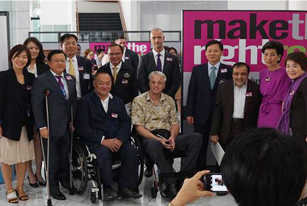
[Opening Ceremony of UN ESCAP Accessibility Center (2015)]
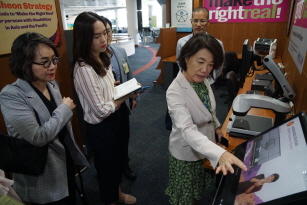
[Monitoring the management status of the Centre (2019)]
Facilitating at the MRR Fund Working Group Meeting
Background
ESCAP works provides results oriented projects, technical assistance and capacity building to member states in macroeconomic policy, poverty reduction, social development, statistics, and energy to overcome some of the Asian-Pacific region’s greatest challenges. In particular ESCAP promotes rigorous analysis and peer learning in our core areas of work; translates these findings into policy dialogues and recommendations; and provides good development practices, knowledge sharing and technical assistance to member States in the implementation of these recommendations. This being so, ESCAP providing Working Group on the Asian and Pacific Decade of Persons with Disability, as a consultative body of Incheon Strategy, serves those purposes which the MRR Fund secretariat supports facilitating. Further more the MRR Fund Working Group consist of government officials of ESCAP states and experts of civil society organizations, to provide technical assistance for the member states and associate member states held since 2014 so as to effectively implement the Incheon Strategy. Following the Jakarta Declaration on the Fourth Decade of Persons with Disabilities, an ad hoc meeting of the Fourth Decade of Persons with Disabilities Working Group was held in 2023.
Activities
The Incheon Strategy was adopted in November 2012 as the action plan of ‘The Third Asian and Pacific Decade of Persons with Disabilities’ with the first Working Group in Incheon and the first Incheon Strategy Working Group Meeting in February 2014. From its incipient setting, ESCAP members and CSOs came to agree upon a draft of the road map as operational guidelines to ensure full compliances with the Incheon Strategy among participants and adopted the road map at the 70th commission session of ESCAP.
Consequently, 14 government officers and 17 CSO representatives (including observers) gathered in the 2nd Working Group at New Dehli, India in March 2015, and 15 government officers and 17 CSO representatives (80 persons in total) gathered in Bangkok in March 2016 to track the status quo of fund raising and fulfillments of Incheon Strategy.
In March 2017, 11 government officers and 11 CSO representative (70 persons in total) gathered in Bangkok, Thailand, and discussed the role and effectiveness of Working Group for the remaining 5 years of the Incheon Strategy.
In 2018, the meeting was not held because the High-level Intergovernmental Meeting on the Midpoint Review of the Asian and Pacific Decade of Persons with Disabilities, 2013-2022, was held in Beijing on December 2017. The 5th Working Group was held from 21st to 22nd February 2019, which was the first meeting of newly consisted Working Group for the remaining 5 years of Incheon Strategy. About 40 persons participated in the meeting including 15 government officers and 15 CSO representatives. The 6th Working Group was held from 24th to 25th September 2020, which was the first online meeting after the 1st meeting opened due to the pandemic protection from COVID-19. As the COVID-19 was the biggest issue of the year, thus discussion on COVID-19 and persons with disabilities was adopted as agenda 5. As it was encompassing the whole subject it was dealt with in every agenda during the meeting. It is estimated that around 70 people had participated in the meeting. The 7th Working Group was held from 8th to 9th December 2021, which was also held via online, and shared opinions of member states and organizations regarding COVID-19 and persons with disabilities agenda. It is esimated that around 70 people had participated in the meeting.The first meeting since the launch of the 4th Asia-Pacific Decade of Persons with Disabilities was held in Bangkok on November 8-9, 2023 as an ad-hoc meeting of the Working Group. As it was the start of a new decade, the meeting focused on the main priorities of the Jakarta Declaration on the Asia-Pacific Decade of Persons with Disabilities, the operational guide for the implementation of the Jakarta Declaration, and discussions on funding mobilization.
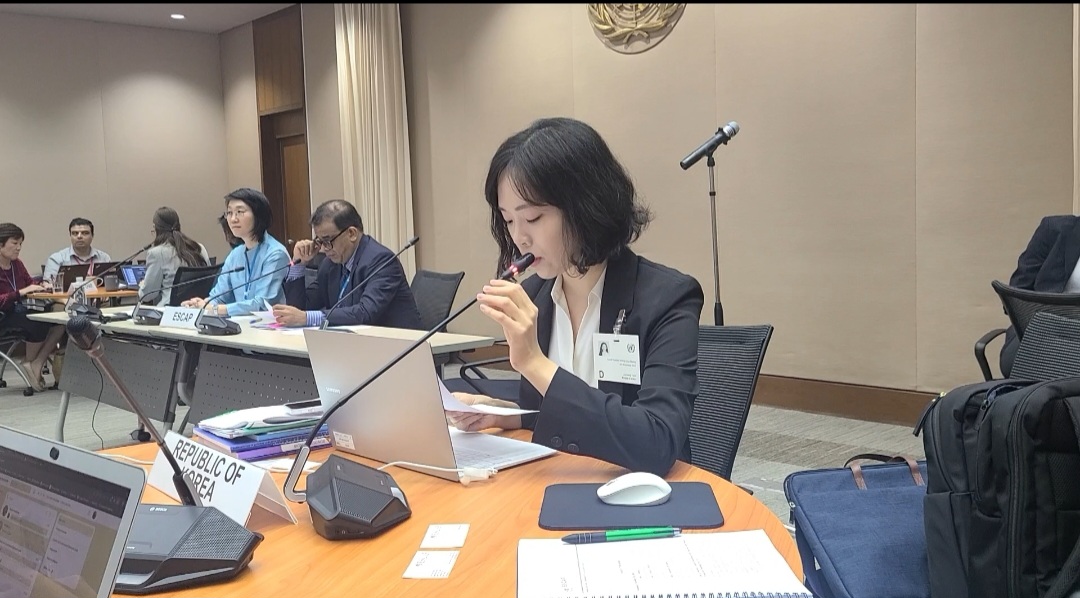
[The ad-hoc Working Group Meeting on the 4th Decade(2023)]
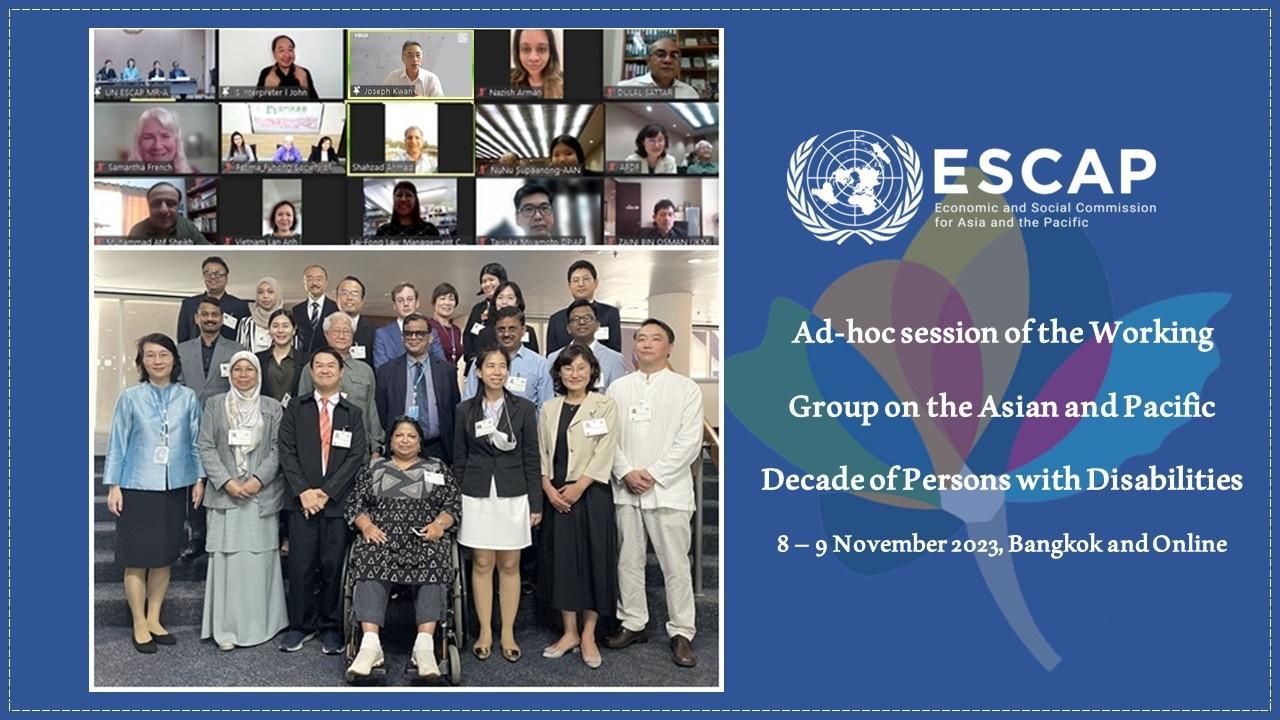
[The ad-hoc Working Group Meeting on the 4th Decade(2023)]
Meeting of Champions and Promoters on Asian and Pacific Decades of Persons with Disabilities
Background
To achieve the goal of Incheon Strategy, stakeholders agreed on the necessity to establish the road map for the implementation of the strategy and cooperate as an effective team. Accordingly, in August 2012, the Asian and Pacific champion election committee came up with 10 champions and 7 promoters whose lifes were dedicated to uphold the rights of persons with disability where they stand. Most of them were considered as experts, social activists, politicians with disability related knowledge and experiences at national or international level. The elected champions and promoters take leading roles to raise awareness and implement Incheon Strategy in the Asia and Pacific regions.
Activities
Meeting of champions and promoters on Asian and Pacific Decades of Persons with Disability firstly launched in October 2013. The meeting was weighted to formulate the road map, find methodological approach to the each objectives of Incheon Strategy, as well as search for the way to forage partnership. In this meeting Cha Hyun-mi, Director of Division of Rights Promotion for Persons with Disabilities from the Ministry of Health and Welfare and the researcher in charge of Office of Policy Research at KODDI attended as a representative of Korea.
Participating in the High-level Intergovernmental Meeting on the Midpoint Review of the Asian and Pacific Decade of Persons with Disabilities, 2013-2022
Background
The High-level Intergovernmental Meeting on the Midpoint Review of the Asian and Pacific Decade of Persons with Disabilities, 2013-2022, which was hosted by UN ESCAP and CDPF (China Disabled Person’s Federation), was held in Beijing for 5 days, from November 27 to December 1, 2017. There was a Senior officials’ segment for 3 days from November 27 to 29, and Ministerial segment for 2 days from November 30 to December 1. Later, the Beijing Declaration and the Action Plan to Accelerate the Implementation of the Incheon Strategy (E/ESCAP/APDDP(4)/L.4) was adopted on December 1, 2017.
Activities
In the High-level Intergovernmental Meeting on the Midpoint Review of the Asian and Pacific Decade of Persons with Disabilities, 2013-2022, there were about 300 participants including government representative groups from 33 countries as well as UN entities including UNESCAP, governmental agencies and CSOs including DPOs. During the Meeting, 12 items were dealt during five days. The representative group from the Korean government was comprised of 9 persons including Mr. Lee Young-ho from the Ministry of Health and Welfare, Mr. Oh Joon, the former Ambassador to the UN, and officers from KODDI. The Korean government shared the disability-inclusive development cooperation projects by Make the Right Real Fund and the achievement of implementing the Incheon Strategy, through 4 times of official statements and panel discussion. Especially, the Korean government introduced the UNESCAP-KODDI cooperation project to build the comparable and reliable disability-disaggregated data, which was considered as a significant theme during the Meeting, and encouraged the active participation of the member states.
Besides the Korean government’s activities, various CSOs such as APDF, RIAP, APDPO United, APCD, DAISY, DPIAP, IIAP, SADF, PDF, WBUAP, WFDRSA participated voluntarily and actively through holding CSO Forum and Side Events. About 130 persons gathered from CSOs in more than 20 countries and announced the Joint Statement by Civil Society Organizations
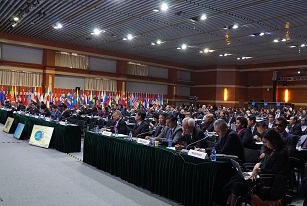
[Front view of the Meeting (2017)]
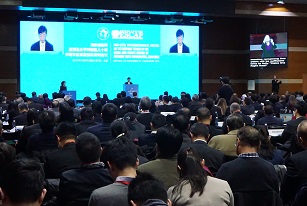
[Opening statement delivered by Mr. Lee Young-ho, Deputy Minister of Health and Welfare, ROK (2017)]
Participating in the High-level Intergovernmental Meeting on the Final Review of the Asian and Pacific Decade of Persons with Disabilities, 2013-2022
Background
The High-level Intergovernmental Meeting on the Final Review of the Asian and Pacific Decade of Persons with Disabilities, 2013-2022 hosted by UN ESCAP and Ministry of Social Affairs of Indonesia, held in Jakarta, Indonesia for 3 days from October 19 to 21, 2022 by online and on-site. As the outcome of this meeting, Jakarta Declaration on the Asian and Pacific Decade of Persons with Disabilities, 2023-2032 was adopted on October 21, 2022.
Activities
In the High-level Intergovernmental Meeting on the Final Review of the Asian and Pacific Decade of Persons with Disabilities, 2013-2022, there were about 400 participants including government representative groups from 41 countries as well as UN entities including UNESCAP, governmental agencies and CSOs including DPOs. During the Meeting, 4 agendas were dealt and the main agendas were ▲ (Agenda 2) Review of progress and challenges in the implementation of the Asian and Pacific Deade of Persons with Disabilities, 2013-2022, and the Incheon Strategy to “Make the Right Real” for Persons with Disabilities in Asia and the Pacific, ▲ (Agenda 3) Forward-looking policies and strategies for disability-inclusive development in Asia and the Pacific during the period to 2030, focusing on key and emerging regional issues and opportunities. The representative group from the Korean government was comprised of 5 people from the Ministry of Health and Welfare and KODDI. Through the video, Minister of Health and Welfare delivered the special address which introduced achievements made as the Secretariat of Make the Right Real and shared a commitment for the further cooperation during the Post-Incheon Strategy era.
Four round-table discussions structured around promising strategies for accelerating disability-inclusive development in the next decade. On the other side, side events had fostered the discussion of concluding the third decade and planning up the new initiative.
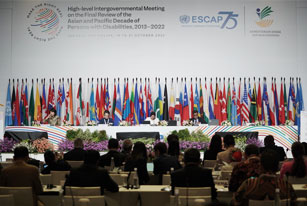
[At the Meeting venue (2022)]
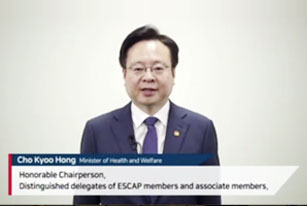
[Special address by Minister of Health and Welfare, ROK (2022)]


